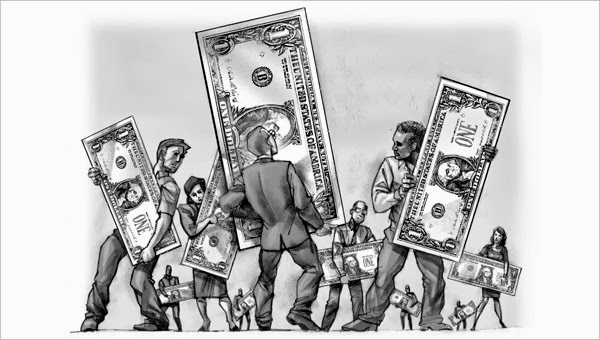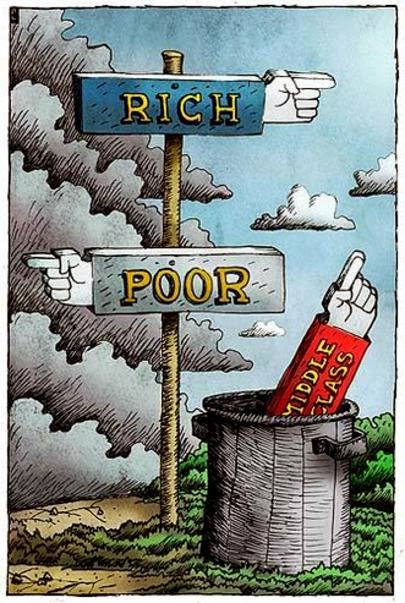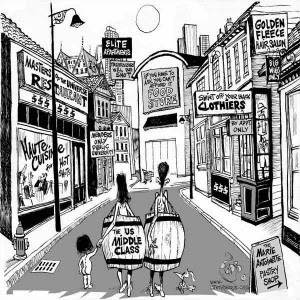The Poverty of Income Inequality
By Daniel Greenfield
SultanKnish.Blogspot.com
The left lives from social crisis to social
crisis. Now it is leaping nimbly away from its last
mess, the great crisis of the uninsured (who have
decided to stay uninsured despite Obamacare's fines)
over to the great crisis of income inequality.

If you believe the left, the leading economic
problem that Americans face today is not a lack of
jobs
or the cost of living, but a crisis of CEO salaries.
If only the great beast of government slumbering in
the chilly waters of the Potomac would bestir itself
to raise taxes on the rich some more we could move
on from those $4 trillion government budgets we
can’t afford to $6 trillion government budgets that
we really can’t afford.
The crisis of income inequality, in which some
people make a lot more money than everyone else, is
irrelevant in an economy where the problem is not
that incomes aren't high enough, but that they don't
buy enough, and that on the second term of the man
who claimed to be able to lower the water level of
the oceans, there still aren't enough jobs at
minimum wage or any other wage.
A look at why
the price of food or
used cars have risen so sharply under Obama
would raise all sorts of troubling questions that
that the left has no interest in exploring. Like
O.J. Simpson, it already knows who the guilty party
is. It’s the smug face looking back at it every
morning in the mirror.
The left’s answer to the high price of medical care
wasn't to discuss why prices were so high and what
was behind the bizarre dysfunctional pricing
ecosystem, but to wrap the whole thing up in one big
government mandate complete with a planned medical
economy of price controls and resource limitations
administered by death panels whose existence they
deny.
Its solution to cost of living issues is to raise
the minimum wage.
That's a slogan that sounds good, because everyone
knows more money means more money. At least until
you remember that the dollar, like an Obama promise,
has no absolute buying power value. And the
availability of jobs isn't a fixed value either.
Raising the minimum wage eliminates jobs and raises
the cost of living so that those who keep their jobs
now have more money that buys the same amount.
Raising the minimum wage to help the poor is a
matter of destroying the village to save the village
and then rebuilding a smaller version of it.
But the left’s agenda isn't to make life better for
the people at the bottom of the economic ladder.
It's to build up their planned economy with failed
solutions that aren’t meant to solve anything. The
left's solutions don't work, because the problem
they’re solving isn’t economic inequity, but their
own lack of absolute power. And they solve that
problem with economic solutions that fail,
necessitating more power grabs until they have
complete control.
The progressive solution to income inequality is
government intervention. But when has centralization
ever produced income equality?
The USSR was the ultimate experiment in central
planning. The Soviet Constitution declared, "The
principle applied in the U.S.S.R. is that of
socialism: From each according to his ability, to
each according to his work."
The Soviet Union was supposed to be a classless
society. Western leftists assumed that was true.
They were wrong. Not only did the Soviet Union have
a rigid hierarchy of classes, but
it had the same income inequality as any other
economy in its class.
After WW2, the wealthiest ten percent of Russians
took home
more than seven times as much as the poorest
Russians did.
Factory bosses took home 100 times the salary of
factory workers. Managers made five times what their
employees did. A small percentage of the country
wallowed in luxury while a sizable underclass
struggled to put food on the table. And these
figures are hopelessly inadequate to describe real
income inequality in the USSR because most of the
real income at the top went unreported because it
was derived from corruption and bribery which were
and are widespread.
Official income in the USSR was only a fraction of
real income which came from access to power. The
Soviet black market was the real source of much of
the wealth of the Soviet official who used his
position to divert goods into the black market and
even of the Soviet worker who could get rich on the
side if he was fortunate enough to have a position
in a factory that produced something worth stealing.
But it wasn't income inequality in the USSR that
led to poverty and misery. It was the planned
economy whose control of the means of production
created product shortages by not producing what
people wanted, rather what it thought they should
have, and whose control over the means of
distribution made the black market into the only
real source of needed products.
The gap between the rich and the poor matters less
than what the poor can buy for their money. That is
why the left would rather talk about income
inequality than the standard of living. It wants to
play around with wealth redistribution, instead of
dismantling their programs that make life so
expensive. The same hypocrites jabbering about
income inequality dream of imposing a Green carbon
tax on everyone that will further raise the prices
of all goods and services.
The left inflicts poverty and then campaigns against
it. It raises the prices of products and the cost of
services, it devalues incomes, destroys jobs and
raises energy prices… and demands even more
regulatory powers so that it can finally solve the
poverty mess it creates once and for all.
The United States has three times the income
inequality rate of the Post-Communist Slovak
Republic. But do you really want to live in the
Slovak Republic,
the second poorest member of the Eurozone, where
the average monthly salary is barely above a
thousand dollars a month and prices aren't nearly
low enough to make up for the difference in
disposable income.
Income inequality doesn't always mean prosperity. It
can mean that, as it does in Mexico, that an elite
has locked up the economy. It can also mean that the
economy is productive. Income equality however
usually means stagnation. Even more often it means
that much of the real economic activity is
unregulated, taking either in a black market or
abroad.
Outside of the class warfare agenda, income
inequality is not in and of itself meaningful. It
exists as a political slogan.
Even if we assume that income inequality, rather
than the standard of living, is the issue to focus
on, the worst possible way to achieve it is through
more centralization. Free enterprise top 1 and 10
percent incomes are vulnerable to market
fluctuations. That's not the case in the Socialist
sphere where incomes remain high regardless of
economic performance.
A CEO who runs a company as badly as Obama runs the
country risks his job. Obama risks nothing. Neither
do the army of staffers and bureaucrats, many
pulling down six-figure incomes, who make up his
regime.
Washington D.C. is a great place to talk about
income inequality
because it has one of the highest levels of
income inequality in the country. Obama declared
that income inequality is the defining challenge of
our time. It's a challenge localized in the very
cities that voted for him.
Progressives might try to argue that Obama won those
cities based on the support of the poor, not the
rich, but he also
won 8 of the 10 wealthiest counties in the
nation. Not only did he win them, but he won them by
margins greater than the national vote. And that
shouldn't be surprising, since of the wealthiest men
in America, numbers one and two were both strong
supporters of his campaign.
But the left doesn't actually hate the rich. To do
that it would have to hate itself.
Occupy Wall Street wasn't a bunch of unemployed
workers looking for a more compassionate economy.
A third of the Occupiers had household incomes
of six figures. The majority were college grads and
39 percent of the latter had graduate degrees.
The left does hate people who work for a living. The
poster child for its childish screeds is Elizabeth
Warren, a populist voice of the people
who spent three-quarters of a million on a condo
as soon as she got to Washington D.C. and
once scored $90,000 from the government for
serving as an expert witness.
Elizabeth Warren was right and wrong when she said
that no one gets rich on their own. There are people
who do get rich on their own. And there are people
like her who get rich through their political
connections. The left hates people who work for
their money and get rich on their own. It loves
"public servants" like her who get rich off their
“community” political connections.
The left argues that the income inequality in this
country shows that we have an oligarchy. They're
right. And they're the oligarchy.
In Washington D.C. there is an oligarchy that
monopolizes wealth and loots the working people.
It's not a capitalist oligarchy even though it
includes plenty of CEOs. It's a government oligarchy
just as it was in the Soviet Union.

The left's hypocrisy on income inequality is so
obscenely ridiculous that it surpasses satire.
Warren Buffett, the second-richest man in America,
made billions from a bailout
that he helped shape, and then campaigned with
Obama against income inequality complaining that the
rich were not paying enough taxes.
Because if the rich paid even more taxes than they
already do, he would be able to profit from even
more government bailouts when progressive
profiteering from government-mandated social justice
mortgages goes awry.
America doesn't have an income inequality problem.
It has a government problem. The growth of
government has lowered the standard of living. The
standard
of living peaked before Obama took office and
then fell in the
sharpest such drop in recorded American history.
The left can shriek about raising the minimum wage
all it likes, but the American worker today makes
57% less an hour than he did in 1970. The left's
class warfare is built on a foundation of fake money
and lies. Its governments can play with these
numbers all they like, but they cannot and will not
restore the standard of living that Americans had in
1970.


